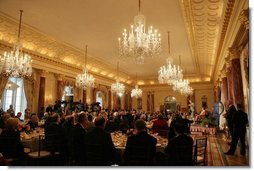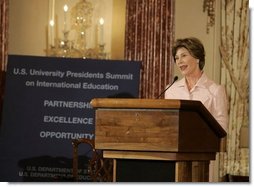|
Home >
News & Policies >
January 2006
|
For Immediate Release
Office of the First Lady
January 6, 2006
Mrs. Bush's Remarks at U.S. University Presidents Summit on International Education Luncheon
The State Department
Washington, D.C.
1:15 P.M. EST
MRS. BUSH: Thanks so much. I hate for everyone to stand right in the middle of their lunch. But thank you all very, very much for doing that. And thanks a lot, Dina, and thank you for what you do every day to get out the message about our country. I appreciate it very much.
And I'm here to introduce our next speaker. But of course, I had to take this opportunity to just tell you all a few things. I was in Tanzania when they sang that special song for me that they'd written the lyrics about on a program that is actually, I think, run by the State Department, and that is to get books into libraries and school libraries in Africa. And so it was really a thrill to be able to represent the United States at this new library in Tanzania with all of the students and then their libraries stocked by the United States government with books.
 I am so thrilled to be here with all of you. I know that the
universities that are represented here, the ones that you represent, are
uniquely situated to foster connections between people in our country
and people around the world. And I know you already do so much, from
your student year abroad programs to foreign service opportunities that
you offer your own American students. Many, many American students have
the opportunity to travel and work in other countries, and I appreciate
that very much.
I am so thrilled to be here with all of you. I know that the
universities that are represented here, the ones that you represent, are
uniquely situated to foster connections between people in our country
and people around the world. And I know you already do so much, from
your student year abroad programs to foreign service opportunities that
you offer your own American students. Many, many American students have
the opportunity to travel and work in other countries, and I appreciate
that very much.
And then, of course, you welcome thousands of foreign students to your campuses. I'm really happy that the Iraqi and the Afghan Fulbright Scholarship has resumed. Several schools participating in this summit host Fulbright recipients, and I want to thank you all for doing that.
In 2004, George and I hosted the G8 leaders in Sea Island, Georgia, and for the Spouses Program, I invited an Iraqi Fulbright Scholar, a young woman who was at Indiana University then, and now she's at Duke working on her Master's. So at a meeting with Cherie Blair and Bernadette Chirac and Sheila Martin from Canada and Lyudmila Putin, Dalia, this lovely Iraqi Fulbright Scholar, told us her story. Her family lived in a town on the border, Iranian border, of Iraq, and when she was a little girl during the Iraqi-Iranian war, her village was gassed. And she was temporarily blinded because she was little and she -- she was four, and she was separated from her family, and so she drank water from the street. And so she was injured more than her sisters were. She was one of nine girls. The parents continued to have a son -- tried to have a son but never did.
But anyway, now, of course, she gets to be here in the United States studying with her Fulbright Scholarship. And she told us, and I think this is very instructive for all of us, how disturbed she was by the impressions Americans had of Iraq, and that when she told students in her university where she was that she was from Iraq, people gasped in horror because Americans' impressions of Iraq are so bad. And she wanted all of us to know, each one of these spouses of the leaders of the G8, she wanted people to know the real Iraq and not the Iraq that the media portray. And she said Iraq is a country of 25 million people, each with their own hopes.
 And so not only in the United States here with her Fulbright Scholarship
is she learning about the United States, but she's also having the
chance to instruct us about her country.
And so not only in the United States here with her Fulbright Scholarship
is she learning about the United States, but she's also having the
chance to instruct us about her country.
Another great program that's run out of the University of Nebraska has been bringing female teachers from Afghanistan to the United States every semester. It's for a very intensive teacher training program. The Afghan teachers then go home and train other teachers in an effort to get as many teachers into rural areas as possible, and especially as many women teachers in rural areas as possible. They go to very specially designed classes, and they live with host families in Nebraska. Well, each one of us know what those families would be like. I mean, it's no surprise to us that the families in Nebraska who offer to host foreign students, Afghan women, would be the most decent, the most generous kinds of families. But these women -- and I've hosted each of these groups of Afghan teachers at the White House, usually on their way home back to Afghanistan since we started the program -- and they always seem really sort of shocked and surprised at how kind and generous their host families are.
We know, then, that they go back to Afghanistan and they have a real picture of what American life is like in the heartland of our country. And we want more people around the world to see and know the real picture.
Later this month, I'm going to visit Ghana with six university presidents from the United States to unveil the Textbooks and Learning Materials Program. This program links minority-serving colleges in the U.S. with institutions in Africa to provide textbooks and school supplies for African students. I know that by working together, our government and our institutions of higher education can introduce people around the world to the America we know. Ours is a just and tolerant society, a home to people of many faiths and many backgrounds. And certainly none of us claim that the United States is perfect. But we know it's a far better country than the caricatures of America lead many people around the world to believe.
So as we seek to understand and know other cultures, we also want people in other countries to better understand us. And the woman leading that effort here at the State Department is our featured speaker, Karen Hughes. Karen is an accomplished communicator. She's an expert in reaching out to people and getting messages heard. And I've had the pleasure of Karen's friendship for many years, and I'm always impressed by what a great listener and effective speaker she is. So please welcome the Under Secretary of State for Public Diplomacy and Public Affairs, Karen Hughes.
(Applause.)
END 1:23 P.M. EST


